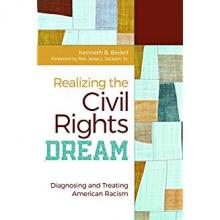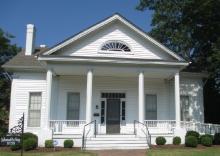Remembering Jackson and Lester
Page Number
On November 17, 2017 Rev. Jesse Jackson revealed that he has been diagnosed with Parkinson's disease. In a statement he said, "I will continue to try to instill hope in the hopeless, expand our democracy to the disenfranchised and free innocent prisoners around the world," he added, "I steadfastly affirm that I would rather wear out than rust out."
Rev. Jackson was the inspiration for chapter 4. His announcement resulted in many people stopping to reflect on Rev. Jackson’s influence. Below is an example of that reflection that Rev. Gil Caldwell wrote.
Reflections on Jackson and Lester by Gil Caldwell
The news that my North Carolina A & T State University colleague, Jesse Jackson has been diagnosed as having Parkinson's disease, concerns so many of us whether we know him or not.
He is a graduate of A & T ("Aggie Pride") in 1964, I in 1955. He is 76, I am 84. I got to really know him as he would come to New York City as head of Operation Breadbasket in the 1970's. Our New York chapter was led by Rev. William Jones of Bethany Baptist Church in Brooklyn. We met on Saturday's at Bethany and it was there I met a young Al Sharpton. Jesse was with us as we engaged in civil disobedience at the headquarters of A and P Supermarkets, protesting their hiring policies. One of my favorite photos is of Jesse Jackson and Gil Caldwell arm in arm as we left court after our arrest.
This week I found a copy of the Nov/Dec. 1987 edition of Tikkun magazine - A Bimonthly Jewish Critique of Politics, Culture & Society, $5.00. On its front page; "Jesse Jackson & The Jews". Michael Lerner, the Editor of Tikkun engaged in "A Dialogue with Jesse Jackson"; "Many of our readers have have been attracted to the political ideals articulated by Jesse Jackson...Yet rumors of Jackson's anti-Semitism have persisted." The "Dialogue" sought to assess those rumors.
Also, this week I found the Facebook of writer/activist/scholar, Julius Lester. His Methodist preacher father and my Methodist preacher father were colleagues in the racially segregated Methodist, Central Jurisdiction. I met Julius at the University of Massachusetts/Amherst where he was a Professor, now retired. We remember him as active in SNCC, and once a member of the Afro American Studies Department at UMass. He shared this story on his Facebook, describing an event, some 20 years before he became a Jew;
"Late 1960's I was living in a housing project in New York. I was hanging out with a friend of mine and he started complaining about his "Jew Landlord" and how he "had it in for black people". I was 20 plus years from the time I would become a Jew, but what my friend said made me feel uncomfortable. And, I knew I had to say something, but what? I didn't want to lose his friendship, but neither could I be his friend if I were silent. I was silent for a moment and then I heard myself say, quietly, almost quizzically, "What does his being a Jew have to do with him being a bad Landlord?" There was a long pause, and finally my friend saying, "Damn! I never thought of it like that."
I did not argue with my friend. I was not angry with him. I did not make him feel he was doing something wrong. I merely asked him a question which made him think."
I have no intention of explaining why I have written of Jesse Jackson and his illness, Julius Lester and his long ago conversation with a friend, and a 30 year old article about Jesse Jackson and the Jews. I have no explanation other than that two gifted persons, in different ways, Jesse and Julius have touched my life. I believe they have touched your lives as well.
Gil Caldwell
November 18, 2017




 Contact Us
Contact Us